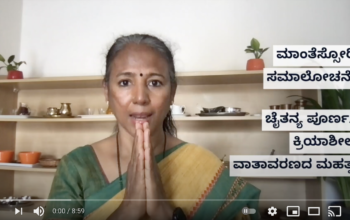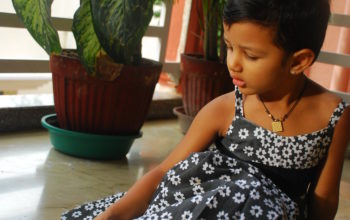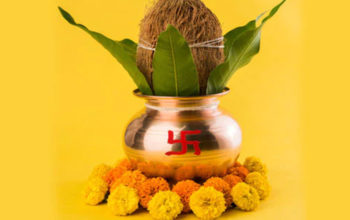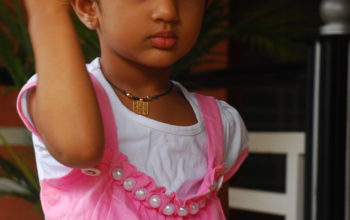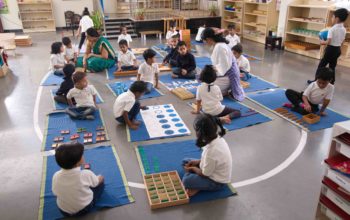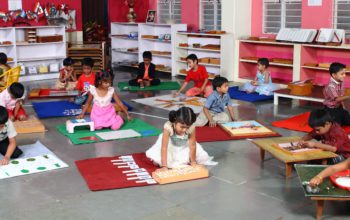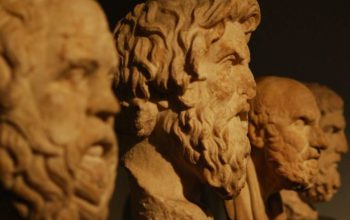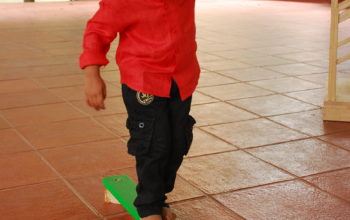ಇಂತಹ ಪರಿಸ್ಥಿತಿಯಲ್ಲಿ ಪೋಷಕರು ತಮ್ಮ ಮಕ್ಕಳಿಗೆ ನೀಡಬೇಕಾದ ಪೂರ್ವ ಪ್ರಾಥಮಿಕ ಶಿಕ್ಷಣವನ್ನು ತಪ್ಪಿಸಿ, ನೇರವಾಗಿ ಒಂದನೇ ತರಗತಿಗೆ ಸೇರಿಸಿಬಿಡೋಣ ಎಂದು ನಿರ್ದರಿಸುವುದು ಸಹಜ. ಆರ್ಥಿಕವಾಗಿ ಇದೊಂದು ಒಳ್ಳೆಯ ನಿರ್ಧಾರವಾದರೂ ಮಗುವಿನ ಬೆಳವಣಿಗೆಗೆ ಅಷ್ಟು ಸಕಾರಾತ್ಮಕವಾದುದಲ್ಲ. ಮಗುವನ್ನು ಆರ್ಥಿಕ ಸಂಕಷ್ಟದಿಂದ ಶಾಲೆಗೆ ಕಳಿಸಲಾಗದಿದ್ದರೂ ಮನೆಯ ವಾತಾವರಣವನ್ನು ಉತ್ತೇಜನಕಾರಿಯನ್ನಾಗಿ ಮಾಡುವುದು ಬಹಳ ಅವಶ್ಯಕ. ಪ್ರೋತ್ಸಾಸದಾಯಕ, ಕ್ರಿಯಾಶೀಲ ಪರಿಸರ ಮಗುವಿನ ಬೆಳವಣಿಗೆಗೆ, ಕಲಿಕೆಗೆ ಎಷ್ಟು ಮುಖ್ಯ ಎಂಬುದಕ್ಕೆ ಐದು ಕಾರಣಗಳನ್ನು ಕೊಡಬಹುದು.
The Spiritual Embryo
The child at birth appears almost nothing. He cannot walk, cannot talk, and he can’t even eat on his own. The same child, within two years, learns so much. He walks, runs, talks continuously; how did it happen within such a short time? For the same work, an adult takes years. How does it happen with the child?
World of Englishes
In Indian culture, we have the word – ‘kalash’. For a person outside our culture, kalash is just a vessel of water with a coconut and leaves. But for Indians, it is a symbol of prosperity, fortune and prolificacy, and weddings and festivals are incomplete without a kalash. It is so important that the tumbling of Kalash is considered to be inauspicious and even a bad omen. This symbolism cannot be transferred through mere translation of words.
Three Reasons to Start Schooling at 2 ½ years
Most young parents are unsure about the right age to start schooling for their children as two extreme views influence their decision. The first view demands children to be admitted to the school as early as 1 ½ years and the second one suggests waiting until they are six years old.
How to Choose a Montessori School
Many think the word ‘Montessori’ means a nursery school. It is a wrong conception. Montessori is a method of education. It could be applied from birth to university level and even to adult education. Nowadays, in Bangalore, we find Montessori signboards in every street and corner. Therefore it is necessary to identify the Montessori schools and their characteristics.
Right Age to Start Schooling
March and April are the summer months in India. This is the time when parents look for the best schools for their children. This adds tension to the already stressful sunny days. There are so many schools, methods, and institutions, but ‘which one is good for my child’ is a common question among parents. Along with this, the question ‘what is the right age to start schooling for their children arises.
Montessori House of Children
little worms in the sand intensely; a school that has low steps, suitable gates, doors and windows convenient for them to operate.
Philosophy of Education
Philosophy of education is a branch of philosophy that addresses philosophical questions concerning education’s nature, aims, and problems.
Movement in Human Beings
Movement distinguishes living beings from non-living things, plants from animals and animals from human beings. In plants, movement results in flowers and fruits. While plants are incapable of moving from one place to another, animals move across the place. Each animal is born with its own perfected unique movement like swimming, climbing, running, slithering, crawling, leaping. These movements are not found in the human being at birth.
Top 3 Misconceptions about Montessori
Montessori is gaining popularity. Most of the Parents are aware of the Montessori method and have a reasonable amount of knowledge. Unfortunately, most of this knowledge is merely a misconception. The three main misconceptions surround the Montessori method.
